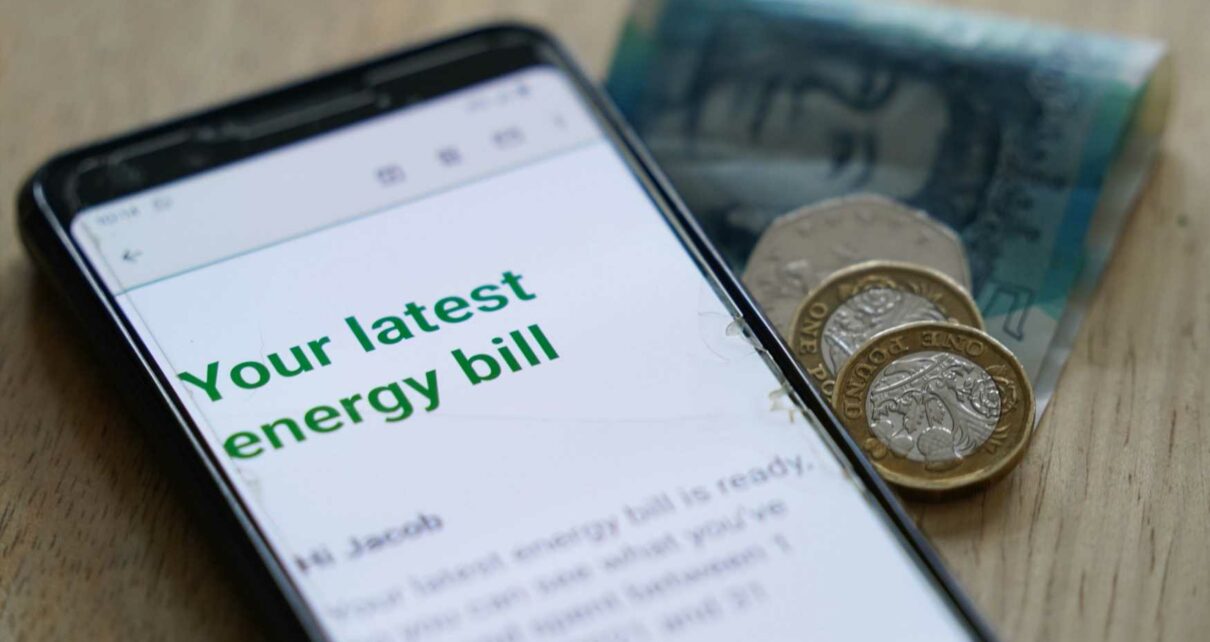ENERGY bills are set to fall by £151 for millions of households this winter.
The energy regulator Ofgem has confirmed the new price cap, which comes into effect on October 1.


The cap will fall from £2,074 to £1,923, the lowest figure since March 2022.
It means the average household will see their annual bill drop by £151.
The energy regulator said it will be cutting the price that a supplier can charge for gas from 6.9p per kWh today to 6.89p from October 1.
The price of electricity will fall from 30.1p per kWh to 27.35p, Ofgem said.
READ MORE IN MONEY

Warning as 7million face higher energy bills this winter despite price cap drop

Millions of households can apply for energy bill support worth £600 in weeks
For those four million customers on pre-payment meters the average bill will drop to £1,949 a year.
It's important to note though that this is not a cap on the overall amount people will pay for their energy.
Instead, it caps the amount that they pay per kilowatt hour, or unit, of gas and electricity.
The £1,923 figure is calculated based on what Ofgem thinks an average household will use.
Most read in Money

Superdrug shoppers rush to buy discontinued designer perfume for just £9

High-street retailer bought by Home Bargains confirms store closure in weeks

Retailer 'to buy 100 stores but majority of shops to close & job losses likely'

Major high street retailer 'makes last-minute bid' to save Wilko stores
This is calculated assuming that a typical household uses 2,900 kWh of electricity and 12,000 kWh of gas across a 12-month period.
Those who use less will pay less, and those who use more will pay more.
Be aware that the exact unit rates and standing charges that you pay will vary slightly based on your supplier, where you live and how you pay for your gas and electricity costs.
Jonathan Brearley, Ofgem chief executive officer, said: "It is welcome news that the price cap continues to fall, however, we know people are struggling with the wider cost of living challenges and I can’t offer any certainty that things will ease this winter.
“That’s why we’ve introduced new measures to support consumers including reducing costs for those on pre-payment meters, and introducing a PPM code of conduct that all suppliers need to meet before they restart installation of any mandatory PPMs."
Energy security secretary Grant Shapps said that it is "encouraging" that families will see their bills continue to fall from October, down £580 on average since their peak.
He said: "We acted swiftly when prices soared because of Putin’s abhorrent attack on Ukraine, spending billions and covering around half a typical household’s bill.
"And we are successfully driving Putin out of global energy markets so he can never again hold us to ransom, and we are boosting our energy independence to deliver cheaper, cleaner and more secure energy to British homes."
Although the price per unit of energy is falling, charities have warned that this will be offset by a rise in the daily standing charge and the fact that last winter’s £400 energy bill discount isn't being repeated.
From October 2022 to March 2023, the government provided £67 a month for six months to subsidise energy bills.
The Resolution Foundation calculates that households that consume less than 79% of typical gas and electricity consumption will still see higher bills this winter.
Around 2.7million of the UK's poorest households will see winter energy bills increasing by £100 or more this year, it said.
While National Energy Action (NEA) says that despite the drop households are still paying around £700 more than they were in October 2021.
Chief executive of NEA, Adam Scorer, said: “Any fall in the price cap is welcome but for 6.3million households still in fuel poverty it will make precious little difference.
"The price cap does not protect those who simply cannot afford the cost of keeping warm. That requires direct government intervention through bill support, social tariffs and energy efficiency."
Gillian Cooper, head of energy policy at Citizens Advice (CA) said that energy bills are still unaffordable for millions.
She said: “Well before the winter hits, we’re already helping record numbers of people behind on their energy bills. Today’s price cap announcement will do little to change that.
"Typical households are still facing sky-high energy costs, now that support schemes have come to an end."
She added that the next few months will push struggling households "over the edge" and CA data suggests it will be as bad, if not worse, than last winter.
Lower prices could mean people may be able to shop around and switch to a different supplier offering a better deal.
Below we explain how you can calculate your bill and reveal the help that's available if you're struggling.
How do I calculate my bill?
To calculate how much you pay on your current fix, you will need to find out both your unit rate for gas and electricity and the standing charge for each fuel type.
The unit rate will usually be shown on your bill in p/kWh.
The standing charge is a daily charge that is paid 365 days of the year – irrespective of whether or not you use any gas or electricity.
You will then need to note down your own annual energy usage from a previous bill.
Once you have these details you can work out your gas and electricity costs separately.
Multiply your usage in kWh by the unit rate cost in p/kWh for the corresponding fuel type – this will give you your usage costs.
You'll then need to multiply each standing charge by 365 and add this figure to the totals for your usage – this will then give you your annual costs.
Divide this figure by 12 and you'll be able to work out how much you should expect to pay each month from July 1.
What energy bill help is available?
Millions are also in line to receive cost of living payments worth up to £1,350.
The first instalment of the £900 payment has been paid to millions on certain benefits, including Universal Credit and Pension Credit.
A further two payments are due in the Autumn and Spring of 2024.
Plus, pensioners who are entitled to a Winter Fuel Payment for winter 2023/24 will get an extra £150 or £300 paid on top of their normal payment later this year.
Energy suppliers also offer plenty of energy grants and schemes to help you out if you're struggling.
Here's a list of schemes open right now:
Read More on The Sun

Big Brother star unrecognisable 22 years after show success

Superdrug shoppers rush to buy discontinued designer perfume for just £9
- British Gas Energy Trust Individuals and Family Fund
- EDF Customer Support Fund
- E.ON and E.ON Next Grants
- Octopus Energy Assist Fund
- Ovo Energy
- Scottish Power Hardship Fund
There's a one-off fuel voucher from your energy supplier if you're on a prepayment meter.
Do you have a money problem that needs sorting? Get in touch by emailing [email protected].
You can also join our new Sun Money Facebook group to share stories and tips and engage with the consumer team and other group members.
Source: Read Full Article

